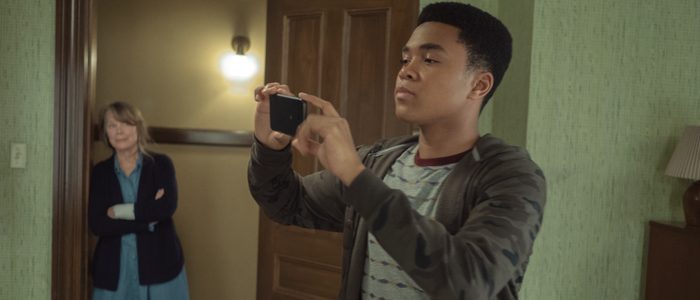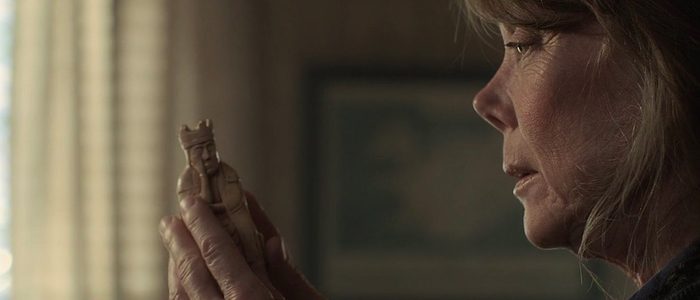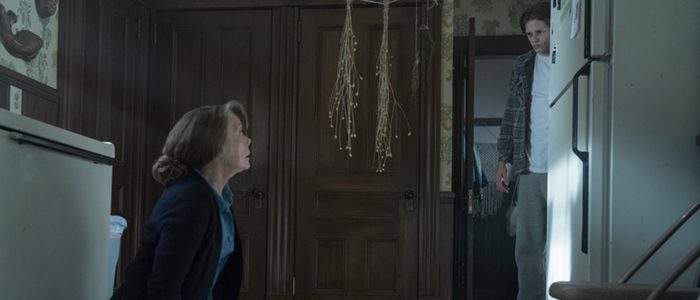'Castle Rock': God Save 'The Queen,' The Best Episode Of The Series So Far
Welcome to our spoiler-filled Castle Rock reviews, in which we explore Hulu's new Stephen King-inspired series. (If you're looking for a spoiler-free review of the show, click here). This week we look at episode seven, "The Queen".
The Queen
Listen: Ruth Deaver has come unstuck in time.
I worried Castle Rock was going to waste the considerable talents of Sissy Spacek, much like Netflix's Bloodline. Spacek has been a near-constant presence on Hulu's Stephen King series, but she's mostly hovered in the background, drifting into scenes from time to time, underused. Episode seven, "The Queen", makes up for any lost Spacek time, and then some, delivering a showcase for the actress that is heartbreaking, and lovely, and unquestionably the very best episode of season 1.
"The Queen" has two very obvious inspirations, and neither are from the works of Stephen King. One is Kurt Vonnegut's Slaughterhouse-Five, in which main character Billy Pilgrim finds himself unstuck in time, popping into various points in his life, both past, present and future. The other is the iconic Lost episode "The Constant", in which Desmond Hume finds himself tripping through past and present. In "The Constant", Desmond needs something – or someone – to hold onto, his "constant", in order to navigate the mind-bending elements of time travel.
Ruth Deaver is also tripping through time, and her "constant" is a set of scattered chess pieces hidden throughout the house. As she explained to her grandson Wendell in the previous episode, the chess pieces are like breadcrumbs. She uses them to "find her way out of the woods", aka the past. Ruth's introduction of the "breadcrumbs" last week was a hint to where Castle Rock was going, but nothing could have adequately prepared us for "The Queen."
I worry sometimes about being too effusive, too hyperbolic, when it comes to giving something a positive review. I worry that I'm overselling things, or not selling them enough. That words like "wonderful" and "excellent" and "incredible" aren't enough. "The Queen" has me in such a mind-frame. How utterly beautiful this episode is; how stunningly emotional. Nothing Castle Rock has done so far has equaled this, and I fear nothing it does going forward ever will again. Writer Sam Shaw finds poetry amidst all this horror. Here is a fine-tuned realization of what makes the best Stephen King stories work: character, not terror. King knows how to use emotions other than fear to his advantage, and so does "The Queen."
"The Queen" opens with Ruth Deaver cowering in fear in her garage, and then sets about moving back and forth in time, filling in the blanks. Spacek is front and center, delivering a tragic, elegant performance. Spacek's Ruth goes through a journey here, from past to present, and we're right there along with her, buying it every step of the way. It works because Spacek makes it work – she draws us in, makes us care for Ruth, and care for what happens to her. We want her to be safe. We want her to be happy. We know that's impossible. There are no happy endings here.
"These things move in one direction," a doctor tells Ruth regarding her Alzheimer's. But that's not true. Not here, at least.
After the intro with Ruth in the garage, we jump backwards. We see Alan giving Ruth her ornate chess set on New Year's Eve. We see Ruth confusing a local neighborhood dog run down in the street for the old family dog that died years go. She asks Alan to burry the dog, even though it's not technically theirs. Alan obliges.
We also see events from previous episodes happening again, only from Ruth's point of view. But these aren't flashbacks. Ruth is a time traveler, and at certain points, she stands in doorways and looks in a her past self. And her past self looks up, and sees her in turn. And she smiles a sad, knowing smile. And you feel your heart beginning to break.
It's not all time-jumps, though. Now and then, "The Queen" stops to dole out some plot points. There's a memory of Ruth, her husband Reverend Matthew Deaver and their son Henry going out into the woods for a picnic. What should be a pleasant family outing turns disturbing when Matthew produces a gun, and rambles out an unsettling story about how he recently tried to kill himself, until the voice of God told him not to. Ruth understandably thinks her husband is going insane, and suggests they go see a doctor. From this conversation, it becomes clear this isn't the very mentally unstable moment Matthew has had. He swears he's not crazy this time, and that doctors "scraped all that out of me," – "that" being the craziness.
Don't Leave
Back in the present, Ruth has to contend with the Kid, who has returned to her house after setting fire to Juniper Hills. The Kid stalks around, wearing Ruth's dead husband's clothes, and Ruth comes to believe that the Kid is Matthew, returned from the grave. At one point, Molly shows up, frantically looking for Henry. Ruth takes this moment to reveal she knows that Molly killed Matthew all those years ago, adding that Molly did the right thing. "But it didn't take," Ruth adds – "Matthew" is back.
Through it all, Ruth keeps trying to find bullets for the gun she keeps in the house. When she jumps into the past, she digs around, asks questions, tries in vain to find the bullets so she can shoot the Kid, who is clearly gearing up to do something very bad to her. These moments are good, and tense, and give the episode a driving force. But it's the quiet moments that really make it so special.
Moments like when Ruth (in the past) visits Alan, back when he was still the sheriff. It's obvious that the two have feelings for each other, but Ruth is still with Matthew – even though she's growing more and more alarmed at Matthew's erratic behavior. Alan pleads for Ruth to come away with him, to anywhere in the country she'd like, with Henry in tow. But Ruth turns him down. She's too concerned with potential consequences. With what people will think.
One fascinating directorial decision by helmer Greg Vaitanes throughout the episode finds Spacek constantly playing Ruth, no matter what the time period. A scene will jump into the past, and Alan and Henry will be played by younger actors, but Ruth stays the same. It's another way of underlining the fact that these are not flashbacks. That these are moments in which the present-day Ruth is jumping into. Maybe not literally, but mentally.
All of the threads of "The Queen" eventually tie together – though even if they hadn't, I'd still love the episode. A magic trick Alan teaches Ruth in the past is put to use in the present when Ruth palms a sedative the Kid tries to force her to take. And Ruth eventually finds those damn bullets. They're in the suitcase that Alan buried the dead neighborhood dog in. We watch as Ruth digs up the grave as the dog, somehow still alive and dead at the same time, digs right by her side – vanishing once she reaches the makeshift suitcase coffin.
Through all of this, the soundtrack for the episode is all slow strings with sudden, sharp-bowed moments. It's melancholy, lonely music; the type that makes you think of rainy days, empty streets, and previously forgotten moments. It sets a haunting tone for the episode, and never once relents. Is this manipulative? Perhaps someone might think so, but I'd argue otherwise. It's instead a reminder – a reminder that all is not well here. That Ruth is ultimately doomed – be it by the Kid, or her disease. There's no cure. There's no way out. The past will eventually slip away, completely, and no chess piece breadcrumbs will fix that.
After attacking the Kid with a knife, Ruth hides in the garage with her now-loaded gun. She hears someone coming. It must be the Kid, right? No. It's Alan. But she finds that out too late – after shooting him. Alan, stunned, dies in front of her on the dirty garage floor, and Ruth breaks down completely.
But the night ends. The day comes. Ruth nervously leaves the garage, goes back into the house, and cleans herself up. And we're suddenly in the past again. Because the doorbell rings, and it's Alan – still alive – at the door. This is a moment Alan told Henry about in a previous episode. The moment where Alan, having returned to Castle Rock after moving to New Hampshire, heads over to Ruth's after someone heard gunshots at her house. He's not the sheriff anymore, but he still feels the need to check things out. Because he cares about Ruth. Because he loves her.
The whole scene is scored by Max Richter's "On the Nature of Daylight", some of the saddest music you will ever hear.
As phenomenal as Spacek is here, I also want to highlight Scott Glenn, particularly for this scene. Glenn is a rough, gruff actor, and he tends to play hard-asses. And while he's been plenty rough and gruff in Castle Rock, this scene allows him a moment of vulnerability. His voice quivers, he fidgets, he looks like a little kid trying to articulate words he has yet to learn. "I came back for you," he tells Ruth, and adds that he knows how unfair it is to dump that on her suddenly. "I'll go if you want me to," he says.
Ruth clings to Alan like a drowning person clinging to a life preserver. "Please, don't leave," she whispers.
We all have moments in our lives that we desperately want to hold on to. Moments from the past that we reminisce about, and think, "God damn, what I'd give to go back to that." That one brilliant, beautiful, fleeting moment. To cling to it. To whisper, "Please, don't leave."
But those moments will, inevitably, leave. It's the nature of time. We can't jump back and forth like Ruth Deaver. We can only remember, and pray that the memory doesn't fade. As Stephen King wrote in Pet Sematary, "God save the past."
I Understood That Stephen King Reference!



